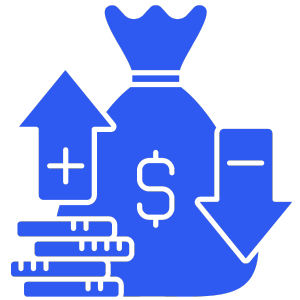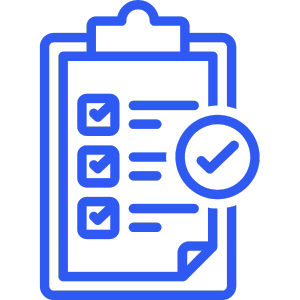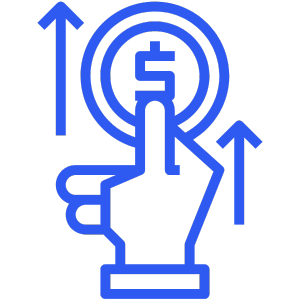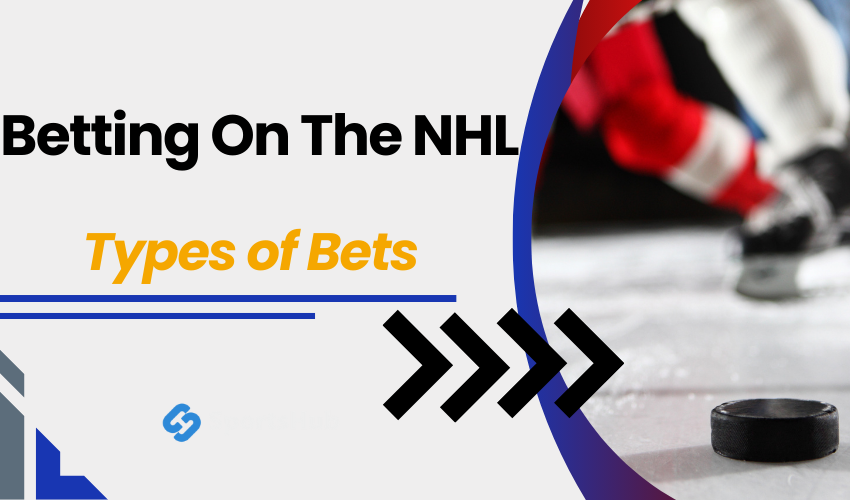NHL Betting Guide: Scoring Big on the Ice
Betting on the National Hockey League (NHL) combines excitement and skill, making it a favorite pastime for many sports fans and bettors alike. With its fast-paced action and strategic gameplay, the NHL offers unique challenges and opportunities for those looking to engage in sports betting.

Table of Contents
Basics of NHL Betting
Betting on the NHL can be as thrilling as the game itself, offering various types of wagers and strategies that can appeal to both novice and experienced bettors. Here’s a breakdown of the basics of NHL betting, including the types of bets, how to understand odds and lines, and the structure of the NHL season, all of which impact betting strategies.
Overview of Types of Betting Found in the NHL

1. Moneyline
This is the most straightforward type of bet where you simply choose which team will win the game. Odds are assigned to each team based on their likelihood of winning.

2. Puck Line
The NHL’s version of the point spread. The puck line typically gives the favorite a handicap of -1.5 goals and the underdog a +1.5 goal advantage. To win a bet on the favorite, that team must win by two or more goals. To win a bet on the underdog, that team must either win outright or lose by only one goal.

3. Totals (Over/Under)
This bet focuses on the total number of goals scored in the game by both teams combined. Sportsbooks will set an expected total, and bettors decide if the actual total will be over or under that number.

4. Props (Proposition Bets)
These are bets made on specific events within the game that might not directly influence the final outcome. Examples include betting on which player will score the first goal, the number of saves a goalie will make, or whether a player will get a hat trick.

5. Futures
Futures involve betting on long-term outcomes, such as which team will win the Stanley Cup or who will win the Hart Memorial Trophy as the NHL’s MVP. These bets are typically placed before the season starts or early in the season.
Understanding Odds and Lines in Hockey Betting
Odds in NHL betting are usually presented in American odds. A negative number (-150) indicates how much you need to bet to win $100, showing a favorite. A positive number (+130) shows how much you’d win if you bet $100, indicating an underdog. Understanding these odds is crucial as they dictate the potential payout and the implied probability of each outcome.
The NHL Season Structure
1. Regular Season: The regular season consists of 82 games where teams accumulate points to qualify for the playoffs. Betting during the regular season can take advantage of trends, team performance, injuries, and other factors that might influence the outcomes of games.
2. Playoffs: The intensity of the playoffs makes for a different betting environment. The pressure and higher stakes often lead to tighter games, which can affect scoring and outcomes. The format is a best-of-seven series, which allows for adjustments in betting strategy as the series progresses.
3. Stanley Cup: Betting on the Stanley Cup is popular in futures markets, but individual game betting is also significant. Understanding how teams have adapted and performed through the playoffs can inform bets on the final series.
Each stage of the NHL season offers unique betting opportunities and challenges. Bettors should consider the type of bet, the odds, and where in the season (or postseason) the game occurs when placing their bets. Knowledge of teams, player conditions, historical performance, and even external factors like travel and venue can all significantly impact betting outcomes.
Analyzing the Game
When betting on NHL games, it’s crucial to analyze a variety of factors that can influence the outcomes of games. Understanding these elements can help you make more informed betting decisions. Here are some key aspects to consider:
Player Form and Team Performance
Player Form: Individual performance can significantly impact the outcome of hockey games. A player on a scoring streak or a goaltender with a series of strong performances can be pivotal. Analyzing recent stats like goals, assists, save percentages, and plus-minus ratings can provide insights into a player’s current form.
Team Performance: Look at the overall performance of the team, including recent wins and losses, performance against teams with similar rankings, and their standing in the league. Consistency is a key indicator of a team’s potential performance in upcoming games.
Importance of Goaltenders in Betting Analysis
Goaltenders are often the most critical players on the ice. A top-form goalie can turn the tide of the game and is particularly crucial in close matchups. Evaluating a goaltender’s recent performances, save percentage, and goals-against average (GAA) is vital. Also, consider the backup goalie’s stats, as they might play a role due to injuries or back-to-back game schedules.
Injuries and Their Impact on Games
Injuries can drastically change the dynamics of a team, especially if key players are missing. Stay updated with the latest injury reports since the absence of top defensemen or leading scorers can affect the offensive and defensive capabilities of a team. Also, consider the depth of the team’s roster, as teams with good depth can better handle injuries.
The Role of Venue and Travel
Home Ice Advantage: Playing at home can be a significant advantage in the NHL. Teams are generally more comfortable and perform better at their home venue, partly due to familiar surroundings and the support of the home crowd. Statistics like home vs. away records can be indicative of this advantage.
Effects of Travel and Back-to-Back Games: The NHL schedule can be grueling, and teams often face multiple games in a short span, including back-to-back games. Travel can lead to fatigue and affect performance, particularly if a team is coming off a game the previous night. Teams on long road trips might also perform differently than when they are at the start of the trip.
Additional Considerations
Special Teams Performance: The efficiency of power play and penalty kill units can also impact game outcomes. Teams with strong special teams can capitalize on their opportunities and mitigate the risks when shorthanded.
Head-to-Head Matchups: Some teams have historical dominance over others, or a particular style of play may consistently prove effective against certain opponents. Reviewing past matchups can provide valuable insights.
Weather Conditions: Although less impactful than in outdoor sports, extreme weather can affect travel plans and the physical condition of players, particularly if they are traveling from a warmer to a colder climate.
By considering these factors, you can develop a more nuanced approach to betting on NHL games, leading to potentially better outcomes and a deeper appreciation of the complexities involved in predicting hockey games.
Types of Bets to Consider When Betting on the NHL

Here are some of the most common bets you may want to use when betting on the NHL.
1. Puck Line Betting
- Definition: Similar to the run line in baseball, the puck line is a form of spread betting in hockey where the favorite must win by more than a set number of goals (usually 1.5) for a bet on them to pay off.
- Strategy: Look for games where strong offensive teams play against weaker defensive teams. Also, consider the impact of home advantage and the current form of the teams. Puck line betting can offer better returns on favorites, especially when they’re likely to win by multiple goals.
2. Moneyline Betting
- Definition: This is the most straightforward betting type where you simply pick the team that you think will win.
- Strategy: Analyze not just the win-loss records but also how teams perform under specific conditions like back-to-back games, against divisional rivals, or after a long rest period. Underdogs often offer value in the NHL due to the league’s competitive balance and parity.
3. Over/Under (Totals) Betting
- Definition: Betting on whether the total number of goals scored in the game will be over or under a predetermined figure.
- Strategy: Consider factors such as the goaltenders’ form, team defense, recent scoring trends, and injuries to key offensive players. Weather conditions don’t apply as the games are played indoors, but fatigue and travel can affect performance.
4. Prop Bets
- Definition: Proposition bets are wagers made on specific events within a game that don’t directly affect the final outcome, such as which player will score a goal, or the number of penalties in a game.
- Strategy: Use player and team statistics to make informed prop bets. For example, betting on a player to score who has a strong track record against a particular goalie or team can be profitable.
5. Futures Betting
- Definition: These are bets placed on events that will occur in the future, like which team will win the Stanley Cup or who will win the Hart Trophy (MVP).
- Strategy: Futures bets typically offer higher payouts due to the difficulty in predicting outcomes so far in advance. Look for teams that have depth, particularly in key positions like goaltender, and those that are performing well heading into the playoffs.
6. In-Game Live Betting
- Definition: Betting on games as they are happening, with odds that change in real-time based on game events.
- Strategy: Watch for momentum shifts within the game, such as a team gaining a power play opportunity or a key player getting injured. Being knowledgeable about the pace and style of play can help predict scoring opportunities and shifts in momentum.
Betting Strategies to Consider When Betting on the NHL
When it comes to betting on the NHL, employing well-thought-out strategies and utilizing available tools and resources can greatly enhance your ability to make informed bets. Here’s a detailed look at various betting strategies, the use of technology and data, and how learning from the betting community can benefit your NHL betting approach.
Risk Management and Discipline


Setting a Betting Budget: The foundation of successful betting is financial discipline. Determine an overall budget for your betting activities based on what you can afford to lose, and stick to it regardless of wins or losses.
Using Staking Plans to Manage Bet Sizes: Implement a staking plan to control the size of your bets relative to your bankroll. Common strategies include the flat betting system (betting a consistent amount on each game) and the percentage method (betting a fixed percentage of your total bankroll per game). These methods help manage risk and prevent significant losses.
Emotional Betting and Chasing Losses: Avoid emotional betting, such as placing wagers based on your favorite team or trying to recover losses with increasingly larger bets. Emotional decisions can cloud your judgment and lead to poor betting choices.
Overvaluing Recent Trends or Team Reputation: While recent performance and reputation are important, they should not be the sole basis for your bets. Always consider a broader range of data and factors to make balanced decisions.
Betting Tools and Resources


Data-Driven Decision Making: Utilizing data is crucial in today’s sports betting landscape. Tools and software that provide advanced analytics and statistical models can give you a deeper insight into games and improve your prediction accuracy.
Reliable Sources for Stats and Real-Time Information: Besides analytics websites, ensure you have access to real-time information such as player injuries, lineup changes, and other game-day factors. Websites like ESPN, NHL.com, and The Athletic provide comprehensive coverage that can inform your betting decisions.
Learning from Professional Bettors


Following Expert Picks and Predictions: Many experienced bettors share their picks and reasoning behind their bets. Following such insights can provide learning opportunities and help you understand the thought processes of successful bettors.
Participating in Betting Forums and Communities: Engaging in communities like Reddit’s r/hockey or specialized betting forums can offer new perspectives and tips. These platforms allow bettors to exchange ideas, discuss strategies, and analyze upcoming games, enriching your understanding and approach to NHL betting.
By integrating these strategies, using the right tools, and engaging with the betting community, you can build a robust approach to NHL betting. This not only helps in making more informed decisions but also in enjoying the betting experience while managing potential risks.